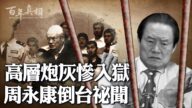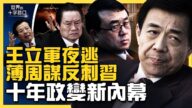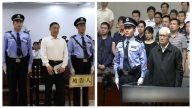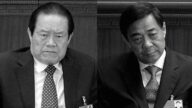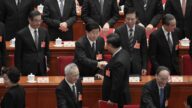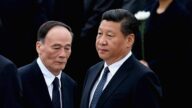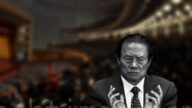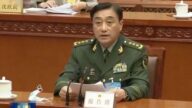【新唐人2014年03月01日訊】中國媒體這兩天連續發表文章,披露「神秘富商」周濱。唯一沒有點破的是,周濱是中共過去的權力核心人物—-政治局常委周永康之子。大陸業界人士指出,這是一種新的權力鬥爭方式,在官方還沒有定論的情況下,媒體先進行放風。
2月26號,北京《新京報》發出一篇深度報導:《公租房撂荒背後隱現周濱「白手套」》,報導指稱,富商周濱依靠強大的官方資源,被懷疑染指北京公租房項目。同一天《搜狐財經》發表文章說,周濱入讀「西南石油大學」,那時候他父親已經高升為「中國石油天然氣總公司」高層。
在此之前,《中國經營報》披露四川富豪劉漢用高價收購周濱的項目,用以維持關係,還曝出周濱涉及山西呂梁市落馬市長丁雪峰買官案。
《搜狐》《以父之名》這篇文章寫道,周濱入讀的大學,是他父親的秘書李華林一手安排的,李華林畢業於「西南石油大學」。周濱也從此進入了一個由校友組成的圈子,他的「學長」們李華林、冉新權、王道富,早圍繞著他的父親組成了一個權力龐大、影響中國石油行業的圈子。
《中國青年報》質詢:周濱背後的利益集團如何形成?而網友發問:周濱,爸爸去哪兒了?
原中央黨校《學習時報》編審鄧聿文認為,這次媒體圍剿周濱,不是當局授意,而是媒體在集體逼宮,指向:勢力跨越石油界和公檢法的中共前政治局常委周永康。
原中央黨校《學習時報》編審鄧聿文:「大家都知道打虎指向周永康。現在不好拿周永康說事,拿他兒子說事。大陸媒體指向也是很明顯的,希望通過輿論的倒逼,來迫使中共把這個案件早日給它了結,早日明朗,早日把所謂的大老虎揪出來。」
但是鄧聿文認為,兒子犯罪,不等於父親犯罪,要坐實周永康的罪證,是一個艱難的較量過程。他認為當局還在挖掘周永康的直接犯罪證據。
鄧聿文:「他做到政法委書記,做到常委,他不可能去搞一些直接的犯罪腐敗行為。這個太不安全。而且他會利用他做常委的時候,把他以前的犯罪線索消滅掉。但是我相信肯定會找出證據來的。他這個四大秘書,包括其他親信,肯定有人會扛不住的,扛不住會供出來。問題就是時間的問題。」
「北京外國語大學」新聞學副教授喬木指出,誰都知道周濱的父親是誰,但是所有的媒體沒有提,只是在暗示。當局的放任,顯示在處理周永康的事情上,在採取不同以往的一種方式。
北京外國語大學新聞學副教授喬木:「過去像薄熙來這些事,包括陳希同,陳良宇,如果沒有《新華社》的通稿,大家是不可能知道這個事,更不可能報導的。只有先有結論,先有中央的決定,要違紀查處,移交司法程序,媒體才能搞定。但是這一次,採取這種報導,我在想是不是政府在利用這個造勢,吹吹風,也許這個事件比想像的還要嚴重。」
喬木分析,現在當局這種處理方式暗示兩種可能,一種是僅僅處理他的秘書、兒子和親家﹔第二種可能,就是先利用媒體對他秘書、兒子先造勢,免得到時候公布處理周永康的時候,普通民眾感到太突然。
喬木:「你想《財經》,所有中國的平面媒體、主流媒體,報導這個事,從他們的編輯、主編以及上面的新聞出版主管單位,沒有他們的許可或者默認、放任,是不可能報導這些事情的。儘管他們報導的時候非常有技術,把這個割裂開,就是講周濱和其他人的事,不提(周永康)。」
喬木認為,當局在打一個模糊的戰略,既不明說,但是意思都點到了,就看大家能不能接受,如果覺得效果還可以,那就可能公開處理周永康,如果覺得反響太大,負面作用太大,可能就不公開。所謂可進可退。
採訪編輯/秦雪 後製/李智遠
Intensive Mainland Chinese Media Reports on the Fall of Zhou Bin
Recently, Chinese media continues to publish articles
disclosing the “mysterious wealthy businessman", Zhou Bin.
The only thing not revealed about Zhou Bin is that
he is the son of Zhou Yongkang, who was
a central figure of the Chinese Communist Party (CCP)
Politburo Standing Committee.
Mainland experts indicate that the authorities are using
the media to leak information before making a conclusion,
which is a new method of power struggle.
Beijing News published an in-depth report on Feb. 26 titled,
“Zhou Bin is Behind the Abandonment of Public Housing".
The report says Zhou Bin is suspected of being involved
in a public rental project in Beijing, relying on official power.
On the same day, Sohu Business also published an article
mentioning the promotion of Zhou Bin’s father to a high level
managerial position at China National Petroleum Corporation
while Zhou was studying at Southwest Petroleum University.
China Business earlier revealed that Sichuan regal Liu Han
bought a project from Zhou Bin at a high price
to maintain their relationship.
Zhou Bin is also involved in an official corruption case
involving Mayor Ding Xuefeng of Luliang City
in Shanxi Province, who purchased his official position,
the report says.
Sohu’s report “Name of the Father" says the university
Zhou attended was arranged by his father’s secretary,
Li Hualin, who also graduated from
Southwest Petroleum University.
Zhou Bin then came into a circle of oil industry alumni
that included Li Linhua, Ran Xinquan, and Wang Fudao.
The oil industry circle centered around Zhou’s father
had grown powerful and influential on a large scale in China.
China Youth Daily questions how the interest group
behind Zhou Bin formed.
Chinese netizens ask,"Zhou Bin, where is your dad?"
Deng Yuwen, former copy editor of the Study Times,
a CCP party school newspaper, indicates media reports
on Zhou Bin were not ordered by the authorities.
He believes the media collectively emphasized catching
Zhou Yongkang, former CCP Politburo Standing Committee
member, who held power throughout the oil industry
and public security.
Deng Yuwen, former Study Times copy editor: “People
all know that ‘fighting tigers’ points to Zhou Yongkang,
but it’s not easy to talk about Zhou Yongkang now,
thus the media talks about his son.
Mainland media’s intention is also very clear,
hoping to use public opinion to turn on Zhou Yongkang,
forcing the CCP to finish this case
and capture the ‘big tiger’.”
Deng Yuwen believes that the son having committing crimes
doesn’t necessarily mean the father committed crimes.
It’s a complicated process to find solid evidence
of Zhou Yongkang’s crimes.
He thinks the authorities are still investigating
evidence of Zhou Yongkang’s direct crimes.
Deng Yuwen: “He (Zhou Yongkang) was the secretary
of the Political and Legal Affairs Committee and a member
of the Politburo Standing Committee.
He wasn’t likely to commit crimes and corruption directly.
It wouldn’t have been safe.
He could also have destroyed all evidence
using his power at that time.
But I believe there must be evidence.
He had four major secretaries and some trusted aides.
One of them will confess.
It’s just a matter of time."
Qiao Mu, associate professor of Journalism
at Beijing Foreign Studies University points out
that everyone knows who Zhou Bin’s father is,
but no media outlets have pointed it out.
They just drop hints.
The authorities allow the media to do so,
which suggests that the authorities are using a different
tactic to deal with the Zhou Yongkang issue.
Qiao Mu, associated professor of Journalism at Beijing
Foreign Studies University: “In the past, with cases like
Bo Xilai, Chen Xitong, and Chen Liangyu, people weren’t
made aware of it until Xinhua news agency’s reports,
and it’s impossible for other media to report on it.
But this time, I think the government may use the media
to create an atmosphere and leak some information.
This case may be more serious than people think."
Qiao Mu indicates that there are two possible ways
the authorities attempt to handle Zhou’s case.
One is to just punish his (Zhou Yongkang’s) secretaries,
his son, and his daughter-in-law’s family.
The other one is to create an environment
by singling out his secretaries and son, so that people
won’t feel Zhou Yongkang’s punishment came
out of the blue.
Qiao Mu: “Think about it.
All of China’s print media and mainstream media reported it.
Without permission from chief editors and the head unit
of Press and Publication, it’s impossible for them to report
on it, although their reports are very skillful— reporting
Zhou Bin but not mentioning Zhou Yongkang."
Qiao Mu believes that authorities are using a purposely
ambiguous strategy, one which doesn’t clearly implicate
Zhou, but signifies he’s the intended target.
It depends on whether people accept it or not.
If the effect of the reports is good,
Zhou Yongkang is likely to be openly punished.
If there is a negative effect, it may not be made public.
Either way is possible.
Interview & Edit/Qin Xue Post-Production/Li Zhiyuan


